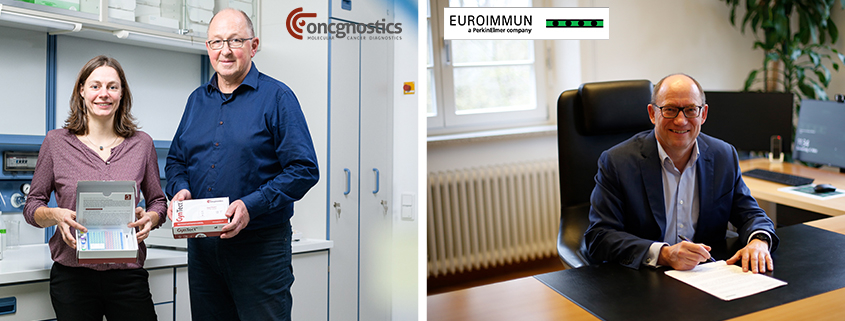The company oncgnostics GmbH, founded in 2012, already launched its first product in 2015: the diagnostic test for cervical cancer “GynTect”. This is now sold in over ten countries in Europe and Asia. In addition, oncgnostics conducts research in the field of diagnostics for head and neck cancer. The company is growing steadily and has around 20 employees, all of whom have remained loyal to the company to date.
The success story of oncgnostics GmbH began in February 2012. “We realized that we wanted to use our research results obtained at the University Women’s Hospital Jena beyond science. Cervical cancer screening was in urgent need of improvement – and we had a solution,” CEO Dr. Alfred Hansel describes the original idea. Thus, a small team around CEO Dr. Martina Schmitz and Dr. Alfred Hansel spun off from the Gynecological Molecular Biology Department of the University Hospital Jena (UKJ).
Detecting cancer with the help of biomarkers
Core expertise of the company are molecular biology markers that can be used to reliably detect cancer cells. These markers are bundled for specific tests. For example, in the case of abnormal gynecological findings, the GynTect test clarifies whether cervical cancer is developing or whether the abnormalities will heal on their own.
The company is also conducting research into the early detection of head and neck tumors. Unlike cervical cancer screening, there is still no regulated procedure for this disease. The Jena-based company is involved in the development of a test designed to detect cancers of the mouth and throat.
Oncgnostics’ overall goal is to improve cancer screening and prevent unnecessary cases. “Cervical cancer shouldn’t even exist anymore with today’s diagnostic and screening options,” said Dr. Martina Schmitz, CSO.
Important support from science and investors
“Without our investors and partners, we would not be where we are today. That is why we would like to express our thanks to everyone who has supported us over the past ten years,” adds Dr. Martina Schmitz. The company continues to be supported by the University Hospital Jena, other partners from the scientific community, and investors. Private investors as well as retail investors have also invested in the company in two very successful crowdinvesting campaigns.


 shutterstock.com 1936727821
shutterstock.com 1936727821 Andrey_Popov/Shutterstock.com
Andrey_Popov/Shutterstock.com oncgnostics GmbH Susann Nuernberger / EUROIMMUN Medizinische Labordiagnostika AG
oncgnostics GmbH Susann Nuernberger / EUROIMMUN Medizinische Labordiagnostika AG oncgnostics GmbH
oncgnostics GmbH Africa Studio/Shutterstock.com
Africa Studio/Shutterstock.com oncgnostics GmbH
oncgnostics GmbH
 oncgnostics GmbH
oncgnostics GmbH